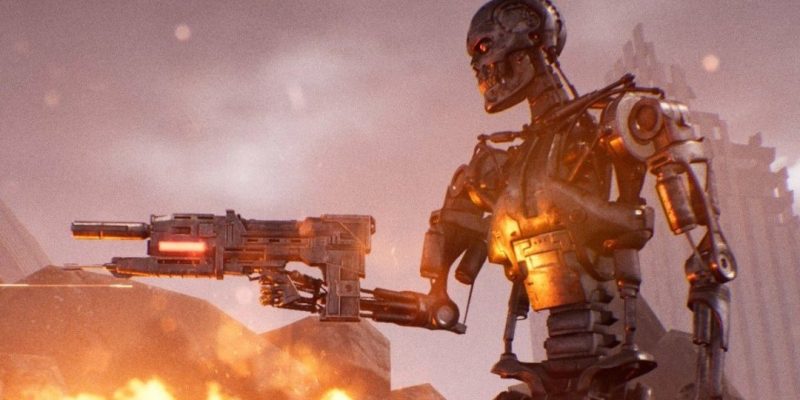These days, most modern games play it fairly safe, and it’s understandable why. Every AAA game has to meet a certain standard. The last console generation shifted our discussion of quality from aesthetics and gameplay to pure fidelity and tech. If it doesn’t look like AAA or feel cutting edge, what’s the point? That’s what criticisms of Terminator: Resistance have ground down to. It doesn’t look amazing and it’s not boasting the niceties of a Naughty Dog or Rockstar, so why bother?
The trick is that level of detail in AAA gaming, even the most minute elements, takes teams of hundreds. A new Assassin’s Creed is developed by over 10 studios in order to achieve the scale players demand. It can potentially take well over a dozen people to craft a single gun in Call of Duty. That doesn’t leave much time or budget for actually being creative, and studios have to hedge their bets on the widest demographics. That’s on top of hoping players won’t just buy the game, but buy it at launch and with all its fancy add-ons, often to make ends meet.
This blooming scale is what killed a lot of studios, with those left standing afraid of facing online backlash for things like Mass Effect: Andromeda, where just having stiff facial animations invalidates the rest of your game. One episode in Visceral Games’ march toward its ill-fated demise involved spending weeks debating how a character would put their hand on a door instead of designing how said character would even fire a gun in their new Star Wars game. It shows you can’t just press a button and have a feature working. There’s a reason games take sometimes half a decade to produce.
This is why we see so few games coming out of publishers now. There’s so much risk and so much cost to deliver what we’re told is a “good” game, but it doesn’t have to be this way. It never had to, honestly. Dontnod’s Vampyr was divisively received by some, but it was precisely the game many others including me wanted it to be. As with many of Focus Home’s published games, Vampyr was also budgeted reasonably, didn’t try to compete at the same scale as other games, and made its money back while operating in a niche. It didn’t chase after perfectly lifelike animations or live-service content.
Modern game criticism tends to portray a game not being for everyone as a bad thing. The creativity of a niche title is still demanded — but with all the polish of a big-budget title. Even before studios were terrified of blooming budgets, if a game was deemed to have “limited appeal,” it was often described as mediocre, as if being built for a particular audience is a bad thing.
Terminator: Resistance has dated visuals and some janky animations, but it’s also probably the purest Terminator experience in years. The way the guns handle, the environments you navigate, and the balancing where even at your strongest, you’re still a glass cannon fighting bulletproof titans — that’s all so incredibly Terminator. Instead of putting polish on a pedestal, which would’ve shrunken the scope of gameplay possibilities, it focuses on being a great Terminator game above all else. Many of the titles I’ve celebrated made this sacrifice.
Lost Planet 3 didn’t redefine third-person shooting or mech games, but that doesn’t keep it from being worthwhile. It harnessed average gameplay and other limitations to strengthen its core themes and story, presenting a refreshingly unique world. The Bureau: XCOM Declassified is a slow-burn experience that demands patience that some players won’t have, but it grants one hell of a payoff for those that stick it out for the long run. Generation Zero is an amazing survival FPS about running through the woods, trying to not get into shootouts whenever possible. Several Resident Evil games have nearly broken the series in half trying bold new ideas at the risk of losing fans. It’s not that interesting games don’t exist; we just have to actually buy and support the ones that do.
I don’t play the games I do because I hate myself or out of a belief that I think it makes me cool. I just want to see something I didn’t expect. It’s heartbreaking hearing some of the behind-the-scenes stories of these titles. Hundreds of people put their hearts into games that not nearly enough people took seriously enough to engage with, despite some technical shortcomings. Face value alone can’t be how we measure a game’s worth. We say we want things to be different in games, for fresh ideas to reach the surface, but our actions far too often speak otherwise. We have to raise these games up to the light.
Every box on your shelf could have upwards of half a decade of work put into it. Not all of them are perfect; hell, none of them are. No game is without flaws, even Uncharted and Red Dead Redemption. Any game can offer fresh and interesting ideas. You don’t have to wait for the Death Strandings of the world to release for a unique experience. There are thousands of handcrafted stories at your fingertips. All you have to do is give them a second look.
